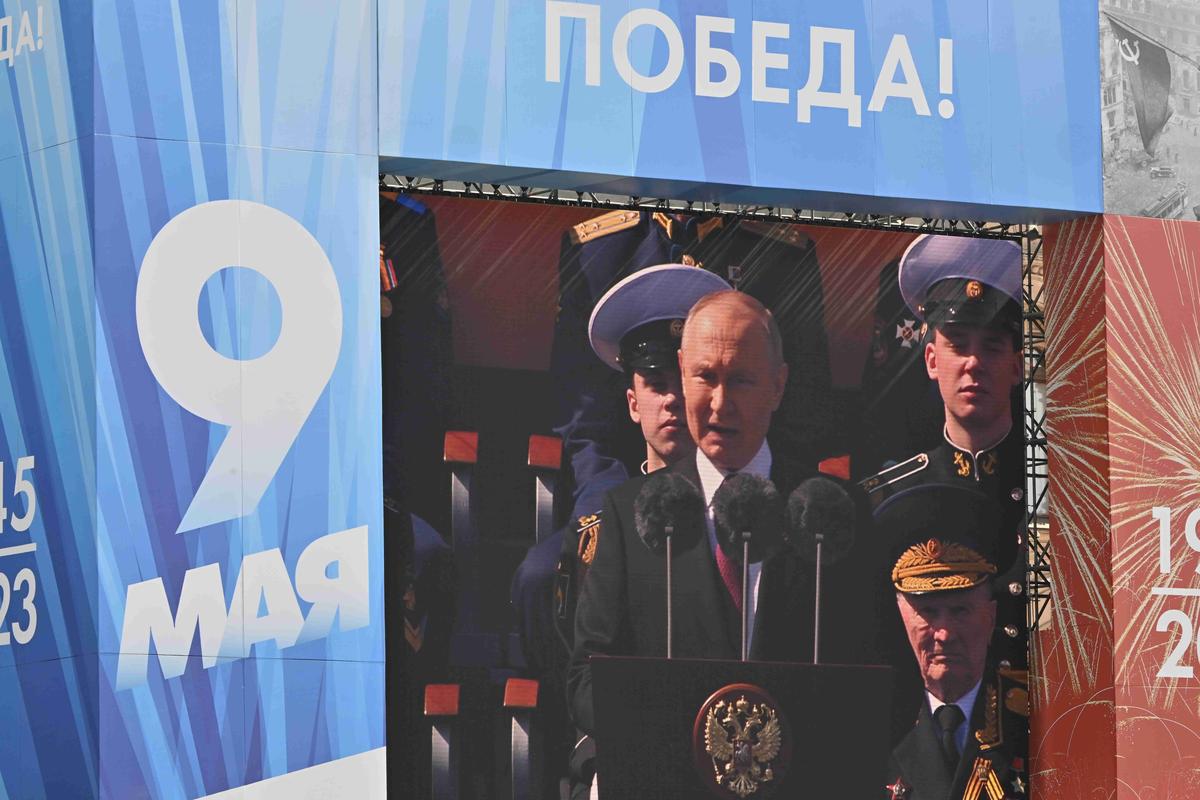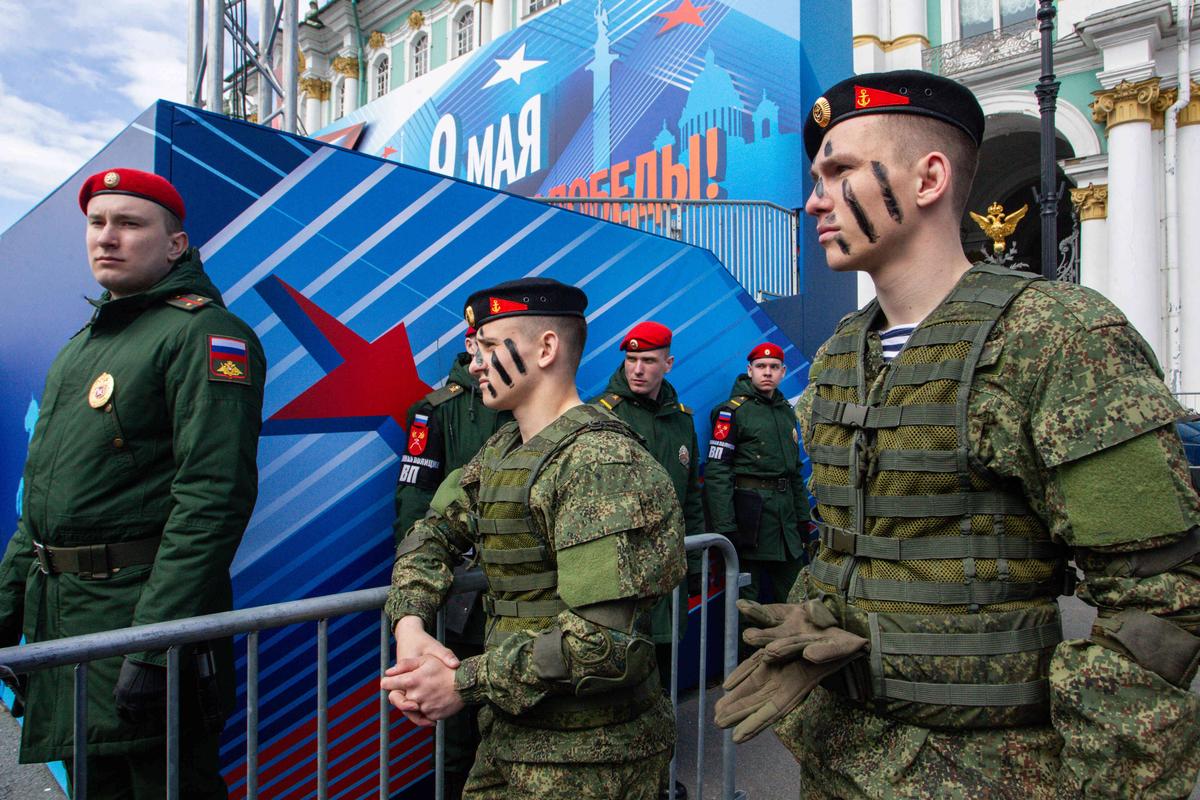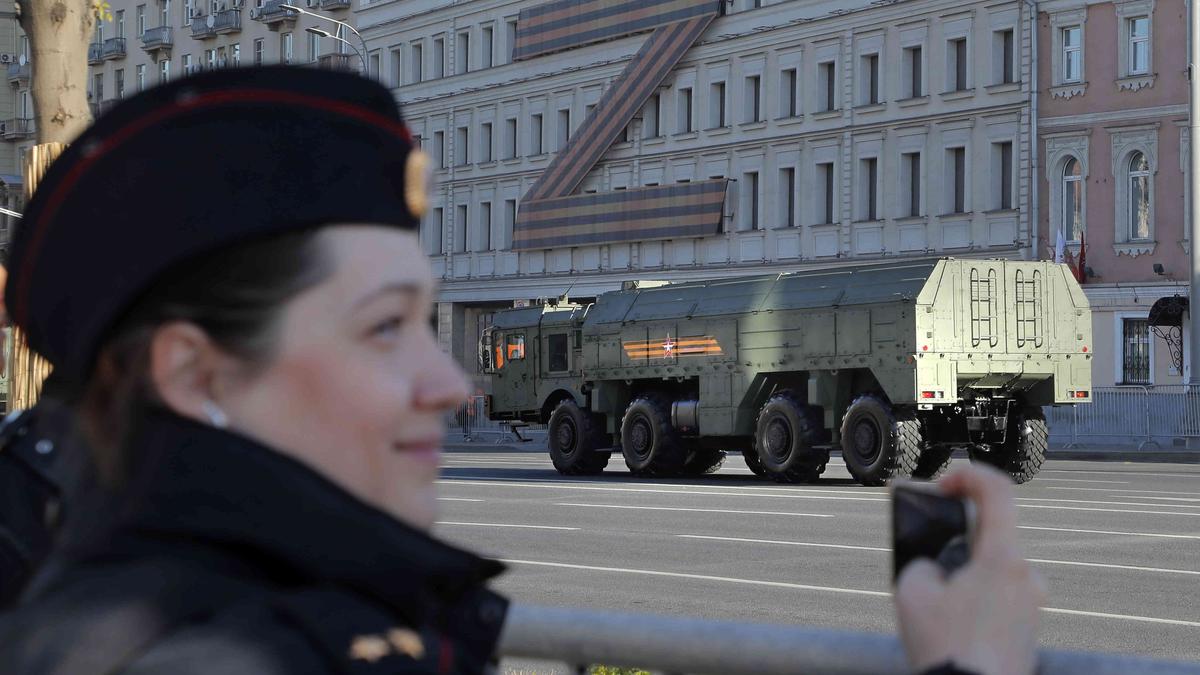While for Europe and most of the world, Victory Day is an occasion to mourn the fallen and commemorate people’s heroic deeds, the Russian regime has increasingly distorted this meaning. The state’s appropriation of this day, which began long before the war in Ukraine, has now led to the victory over Hitler being used in effect as one of the regime’s prime sources of legitimacy and an important tool to justify the war in Ukraine.
Sociologist Svetlana Stephenson discusses how even purely bureaucratic practices, such as obligatory weekly patriotic training in schools — the so-called “Important Conversations” — serve the cause of Kremlin propaganda and how a future new Russia will need to handle Victory Day in a way that does not encourage or promote public acceptance of war as a norm.
Loss of moral capital
Before the invasion of Ukraine, Victory Day remained one of Russia’s few truly national celebrations — a day of commemoration, pride in the bravery and sacrifice of a past generation, and mourning of the millions who lost their lives.
Under Putin, however, each passing year has seen 9 May increasingly transformed into a display of blatant militarism. This year, however, the spectacle is not very convincing given the absence of victories on the front. The triumphant militarism is further undermined by the fact that the formerly untouchable shrine of the Kremlin, which serves as a backdrop for the festivities, has just been demonstratively desecrated by drones dropping explosives on the Senate Palace.
But even if we disregard that incident, the message of Victory Day has become especially problematic under Putin. For many decades, its main purpose in the USSR and other Allied nations was to pay tribute to the heroism of the people who defeated fascism, to commemorate the fallen, and to declare: “Never again”. The war was a catastrophe for the whole world, and the Soviet people’s huge sacrifice was made so that post-war generations could build a new world — a world without wars.

Photo: Sefa Karacan / Anadolu Agency / Getty Images
In the decades after WWII victory seemed to be the starting point of a new future for the countries that defeated fascism. The suffering of civilians as a result of Hitler’s “total war” and the horrors of the Holocaust were deeply felt and had a significant impact on Western culture. After the nightmare of Nazism, with its drive for total domination of society and violence in the name of racial superiority, people in the West dreamed of a world in which there would be no state suppression of civil liberties and no eradication of entire peoples and social groups.
Although the USSR did not share all of these values, it unequivocally condemned the Nazi cult of racial and historical exceptionalism. At the same time, the victory in WWII made the Soviet Union one of the major “moral powers” — a country that put an end to fascism.
It is this moral capital that Putin has now completely destroyed. Russia will long be associated with the war of aggression that he unleashed in Europe.
A cult of war
The universal message of Victory Day had started to fade from public discourse long before Putin annulled it with his invasion of Ukraine — but the process has accelerated since 2014. For the state, victory in the Great Patriotic War was not a prologue to a better world, but a way of elevating Russia to the status of a great power. The regime has appropriated the victory, and official speeches hardly mention anymore that it was a joint achievement by all the peoples of the USSR. And now it turns out that the Allies were Nazi collaborators that actively contributed to Germany’s military buildup, as the head of the Russian Security Council, Nikolai Patrushev, stated in a recent interview.
Unbridled triumphalism (known as “pobedobesie”) and pride for the state have become the chief messages of Victory Day. The war has been incorporated into the ideological concept of a “thousand-year Russia”, in which a strong state has historically enabled Russia to retain its immense territory and repel the attacks of its enemies. In this vision, the universal victory of humanity is replaced by the victory of the “Russian world”, and the Russian people are declared genetically destined to “defeat Nazism”. The calling of the Russian people is not to protect humanity from the “brown plague” of fascism, to use a Soviet expression, but to “protect brothers in blood and spirit” in a sacred mission, as Patriarch Kirill put it last August.
The victory over Hitler becomes an archetypical Russian victory over evil — a timeless phenomenon that does not need to be fleshed out with historical detail. Nazism becomes what sociologist Emile Durkheim called a “sacred evil”, radically different from the ordinary evil amenable to perception and analysis. This evil is associated with powerful global — and even otherworldly — forces.
War becomes eschatological in character. In the Soviet version of history, the USSR fought against a particular state — Hitler’s Germany — and its allies. Nowadays, however, Russian propaganda and top politicians, including Putin, explicitly say that Russia is fighting satanism. Ex-president Dmitry Medvedev, in his increasingly unhinged manner, now calls on Russians to “stop the supreme ruler of hell”.

Russian military cadets is seen during the dress rehearsal for the Victory Day Parade at Palace Square. Photo: Artem Priakhin / SOPA Images / LightRocket / Getty Images
A nation mobilised
According to propagandists, the eternal mission of the Russian people is to fight against an evil which will inevitably rise again, requiring them to constantly make sacrifices and endure hardship. We are witnessing “the drama of eternal recurrence”, to use Nietzsche’s expression. Since the victory over evil cannot be conclusive, the people must always be mobilised, always ready for heroic deeds.
The victory cult has become an important element in justifying the war in Ukraine. Through films and songs, and numerous public rallies and concerts dedicated to the Great Patriotic War, the regime symbolically produces a morally impeccable nation designed, as before, to fight evil.
Even dull bureaucratic events — such as the “Important Conversations” lessons in schools. or the absurd teacher-led parade ground marches of kindergarten children dressed in quasi-military uniforms — are important for propaganda purposes, since they create a mass identification with the victors and gradually lead to the acceptance of new wars.
These activities teach the public: we embody goodness — yesterday, today, and tomorrow. The “others” (the “Nazis”, the West) are evil, we have defeated them in the past and we will always defeat them.
We are incapable of committing war crimes, bombing cities, killing civilians. We are successors to the victories of our grandfathers, and their moral light shines on us.
Thus, the progressive meaning of victory as something that paves the way to a better world has long been forgotten. Russia does not share a common future with the rest of humanity. We have “our own, different future”, as Putin has said. Russia is fighting for itself. “The battlefield to which fate and history have called us is the battlefield for our people, for the great historical Russia”.
Meanwhile, war has turned from something to be avoided at all costs into part of daily life. What will be considered victory in the war with Ukraine? The authorities keep silent. Russia is now living in the world of Orwell’s 1984, where Oceania is constantly at war with Eastasia or Eurasia, and these wars have no discernible rationale.
Once this war — and hopefully the regime that unleashed it — comes to an end, the memory of the great victory over fascism in 1945 should be an occasion for society to reassess history and reflect on the fact that any war is a tragedy for nations and a crime for those who unleashed it.
The lessons that the world tried to learn from WWII — that human rights and freedoms must be universal, that ethnic and ideological grounds for war are unacceptable — must now be learned in modern Russia, drawing on the tragic consequences of Putin’s rule. Instead of indulging in victory parades, performative heroics, and “we can do it again” incantations, Russian society should agree: “Never again”.
Join us in rebuilding Novaya Gazeta Europe
The Russian government has banned independent media. We were forced to leave our country in order to keep doing our job, telling our readers about what is going on Russia, Ukraine and Europe.
We will continue fighting against warfare and dictatorship. We believe that freedom of speech is the most efficient antidote against tyranny. Support us financially to help us fight for peace and freedom.
By clicking the Support button, you agree to the processing of your personal data.
To cancel a regular donation, please write to [email protected]

